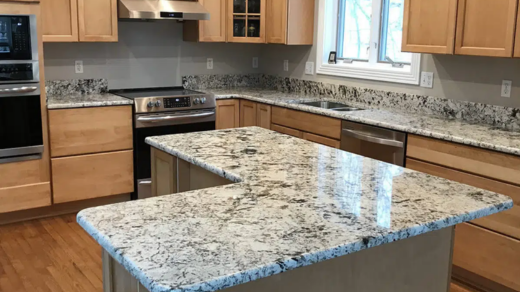When it comes to upgrading your home, few projects make as big an impact as new countertops. They bring freshness to your space, improve everyday function, and instantly add value to your kitchen. At Millennium Designs, we know how important it is to get this process right. That’s why we want to share what goes into kitchen countertop installation, so you’ll know what to expect and how to prepare for a smooth, stress-free experience.
Why Countertop Installation Matters
Your countertops are more than just a work surface, they’re a central part of your kitchen’s layout and design. This is where meals are prepped, gatherings happen, and family moments unfold. Because of that, installation isn’t just about setting a slab in place. It’s about ensuring your countertops are secure, level, and built to last. Done properly, installation sets the foundation for both everyday use and the look of your kitchen as a whole.
Preparing Your Kitchen for Installation
Before the installers arrive, a little preparation goes a long way. Here’s how you can get your space ready:
- Clear the Area
Make sure your current counters are cleared off completely. Remove appliances, dishes, and any items that could get in the way. - Double-Check Cabinets
Cabinets must be strong and level to support your new countertop. If they’re uneven or unstable, adjustments should be made before installation day. - Plan for Plumbing
Since sinks and faucets are often part of the process, it’s best to have plumbing disconnected ahead of time. Some homeowners handle this themselves, while others schedule a plumber. - Access and Pathways
Make sure installers have a clear path into your kitchen. Countertops can be heavy, and having obstacles out of the way avoids delays.
The Installation Process Step by Step
Understanding the process helps you know what to expect. While every home is unique, most installations follow these steps:
- Measurement and Templating
Installers begin by taking detailed measurements or creating a template of your kitchen layout. This ensures accuracy when cutting the countertop to size. - Cutouts and Adjustments
Openings for sinks, faucets, and cooktops are carefully planned and cut before installation begins. This helps the countertop fit seamlessly into your space. - Placement
The countertop is positioned on top of your cabinets. Installers check alignment, levelness, and stability before moving forward. - Securing the Countertop
Adhesives or fasteners are used to secure the countertop in place. This step ensures that it won’t shift or move over time. - Finishing Seams
If your kitchen requires multiple pieces, seams are joined and smoothed to create a seamless, polished look. - Sink and Fixture Installation
Once the countertop is in place, sinks, faucets, and other fixtures are installed and sealed to prevent leaks. - Final Inspection
The installers double-check that everything is level, secure, and ready for daily use. You’ll also have a chance to walk through the finished project with them.
Common Challenges During Installation
Every kitchen has its own quirks, and sometimes obstacles come up. Professional installers are trained to handle these challenges, such as:
- Uneven Cabinets: Adjustments are made so the countertop rests evenly across the entire base.
- Tight Kitchen Layouts: Maneuvering large countertops into smaller spaces requires experience and care.
- Plumbing Complications: When fixtures don’t line up perfectly, adjustments ensure everything works correctly.
What matters most is having a team that can spot issues quickly and resolve them without compromising quality.
Caring for Your Countertops After Installation
Once the installation is complete, proper care keeps your kitchen looking beautiful for years. Here are some tips that apply to all countertops:
- Clean Regularly: Use a soft cloth and gentle cleaners instead of harsh chemicals.
- Avoid Excessive Weight: Don’t stand or place extremely heavy items on the surface, especially near edges.
- Protect from Heat: Always use trivets or pads for hot pots and pans.
- Use Cutting Boards: Cutting directly on the surface can leave marks over time.
By following these simple steps, you’ll maintain both the function and appearance of your new countertops.
Why Professional Installation Is the Best Choice
While DIY projects can be rewarding, countertop installation isn’t one of those tasks that’s best done alone. Countertops are heavy, require precise measurement, and must be installed level for long-term use. Professionals bring the right tools, techniques, and expertise to complete the process quickly and correctly.
Hiring a skilled team also gives you peace of mind knowing your investment is protected. The end result is a kitchen that not only looks great but also functions the way it should.
The Bigger Picture of a Kitchen Remodel
Countertops often serve as the centerpiece of a remodel, but they work best when paired with other updates that complement them. After installation, you might consider:
- Updating Cabinets: Fresh or refinished cabinets give a cohesive look alongside new countertops.
- Adding a Backsplash: A backsplash highlights your countertops and adds character to your kitchen.
- Improving Lighting: Good lighting brings out the best in your kitchen’s design.
- Replacing Hardware: New handles or pulls add the finishing touch to your remodel.
Together, these upgrades create a kitchen that’s functional, stylish, and welcoming.
Final Thoughts
Investing in new countertops is one of the most rewarding updates you can make in your home. When handled properly, it improves both function and style while adding long-term value. At Millennium Designs (https://getcabinetsnow.com/), we’re committed to guiding homeowners like you through every step of the process, ensuring a smooth and satisfying outcome. If you’re ready to refresh your space, kitchen countertop installation is the perfect step toward creating a kitchen you’ll enjoy every day.

